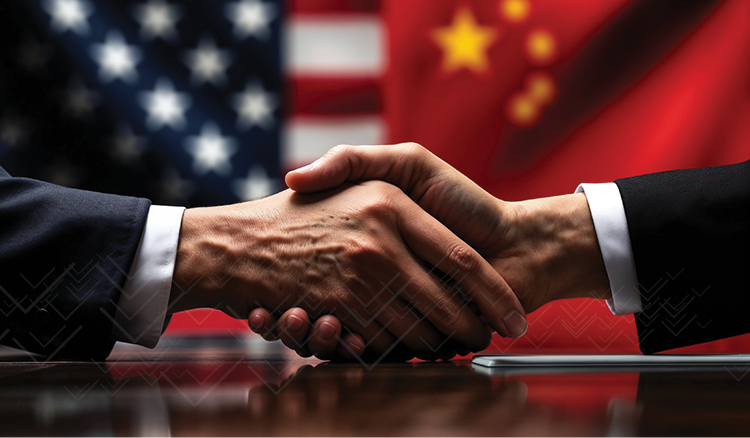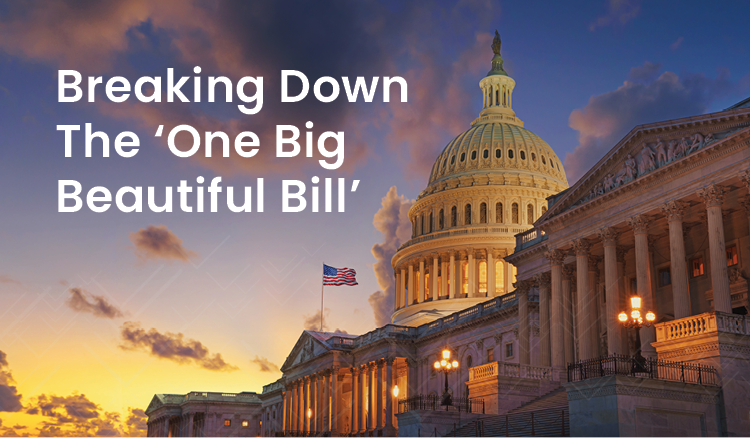Trump 2.0 Week 21 In Review: Discussing The Outcome Of The Recent Trade Talks With China, a Potential Extension To The July Tariff Deadline, and More
It’s been a complex week in the world of trade policy. From tentative progress in trade talks with China and the EU to threats of higher vehicle tariffs, and a potential extension to the July tariff deadline — there’s a lot to unpack.
If you haven’t had a chance to get up to speed, don’t worry. We’ve put together another detailed summary that covers all these latest developments.
Topics covered this week include:
- The outcome of this week’s US-China trade talks
- US-EU negotiation update
- A potential tariff deadline extension for certain trade partners?
- The status of the legal battle surrounding Trump’s tariffs
- Trump's plans to increase the imported vehicle tariff
- GM’s $4B investment in its domestic manufacturing footprint
U.S. and China Make Progress After 2 Days of Trade Talks
On Wednesday, following 2 days of trade talks in London between U.S. and Chinese trade representatives, Trump posted on TruthSocial that "Our deal with China is done, subject to final approval from President Xi and me.”
As part of this agreement, China will resume exports of rare earth minerals and magnets while the U.S. will walk back its plans to revoke visas for Chinese students. Also for now, the U.S. tariff on Chinese goods will remain unchanged at 55%, as will China’s 10% tariff on U.S. goods.
Officials from both described the tone of the talks as constructive, with both sides showing a willingness to keep communication channels open. However, the framework is narrowly focused and does not address deeper issues at the heart of these tensions. The U.S. continues to raise concerns over China’s industrial policies and technology access, while Beijing remains critical of American export controls, restrictions linked to AI and semiconductors, and the fentanyl-related tariff.
Both Treasury Secretary Scott Bessent and Commerce Secretary Howard Lutnick also emphasized that this is an early step in a longer process, and that meaningful progress on a broader deal will take time.
U.S.-E.U. Trade Negotiation Update
While negotiations between U.S. and E.U. officials continued this week with a noticeable pickup in pace, a comprehensive agreement still remains out of reach. EU officials now expect only a basic outline of a deal by the July 9 deadline set by President Trump, with more detailed talks likely to extend into late summer. Commerce Secretary Howard Lutnick shared a similar sentiment and stated that a deal with the EU is likely to be one of the last deals the administration completes.
Discussions so far have focused on key industries such as automobiles, semiconductors, pharmaceuticals, civilian aircraft, and metals. Non-tariff issues like the EU’s VAT system and food safety regulations have also been a sticking point, with the U.S. calling for changes the EU is unwilling to make. While the EU repeated its offer to remove tariffs on industrial and some agricultural goods through a “zero-for-zero” approach, U.S. trade officials formally rejected it this week. Meanwhile, the European Commission has approved €21 billion in retaliatory tariffs on U.S. goods and is drafting a second package worth €95 billion. Officials are also exploring additional countermeasures beyond tariffs, including restrictions related to regulatory and resource access, in case negotiations fail.
Treasury Secretary Bessent States Tariff Deadline Could Be Extended, Although Trump Claims Otherwise
This week, Treasury Secretary Scott Bessent signaled that the 90-day pause on reciprocal tariffs originally set to expire in July could be extended for certain trading partners that are negotiating with the U.S. in “good-faith.”
While speaking at a June 11th congressional hearing, Bessent noted that roughly 18 key partners, including the EU, UK and China, stand to benefit if they continue substantive talks without backsliding. The move aims to reward constructive diplomacy, encourage swift progress on outstanding issues, and prevent the automatic imposition of higher tariff rates that otherwise would kick in once the pause ends.
For now however, details on the extension’s duration and exact qualifying criteria remain unclear. Additionally, it's still not entirely certain whether this extension will even come to fruition or not. Despite Bessent's comments, Trump told reporters Wednesday at the Kennedy Center that a delay to the deadline is unlikely. He also told reporters he plans to set unilateral tariff rates in the near future, stating, “We’re going to be sending letters out in about a week and a half, two weeks, to countries, telling them what the deal is.”
Appeals Court Rules That Trump’s Tariffs Can Stay In Place For Now
The Federal Circuit Court of Appeals stated on Tuesday that tariffs imposed by President Trump will be allowed to remain in effect until at least the end of July, pending a scheduled hearing on July 31. These tariffs, which include a 10% levy on many countries and additional tariffs on Canada, Mexico, and China, were previously declared illegal by the U.S. Court of International Trade, however, the ruling has been put on hold during the appeal process. Trump has publicly celebrated the court’s decision via TruthSocial, asserting that it affirms the government's right to use tariffs as a tool for protecting U.S. interests.
For context, this legal battle centers around whether the president has the authority under a 1977 law to impose broad tariffs during emergencies, with critics arguing such power exceeds legal limits and may violate constitutional principles. While the tariffs remain largely in place, some reciprocal tariffs with neighboring countries are on hold as trade negotiations continue. For more information on this matter, check out our weekly recap article from 2 weeks ago.
Trump Blocks California EV Rules and Threatens Higher Auto Tariff
On Thursday, President Trump signed joint resolutions of Congress to block California’s attempt to ban the sale of new gas-powered cars, a move that would have required increasing shares of electric vehicles in new sales until 2035, when internal-combustion car sales would be entirely banned. The resolutions, passed by a Republican majority, also revoked two other California clean-air policies: one mandating that half of all new trucks sold in the state be electric by 2035 and another limiting nitrogen oxide emissions from vehicles.
In addition to signing the resolutions, Trump threatened to raise U.S. auto tariffs from the current 25 percent, stating that higher tariffs could encourage automakers to build more plants in the U.S. “The higher you go, the more likely it is they build a plant here,” he said. This threat follows recent increases in tariffs on foreign aluminum and steel, which have added pressure on automakers already facing import costs. The move signals a continued focus on using tariffs as a tool to bolster domestic manufacturing.
New Investments in U.S. Manufacturing
Since the start of Trump’s second term, more than 60 major companies have announced significant investments in U.S. manufacturing.
Below are some of the most notable recent announcements.
GM To Invest $4B in its U.S. Manufacturing Footprint
On Tuesday, General Motors announced a plan to invest around $4 billion over the next two years to expand its manufacturing operations in the United States, which will allow them to domestically produce an additional two million vehicles annually. This investment includes a recent $888 million boost for the Tonawanda Propulsion plant in New York to support the development of next-generation V-8 engines. Additionally, GM will expand production at several plants, including Orion Assembly in Michigan, Fairfax Assembly in Kansas, and Spring Hill Manufacturing in Tennessee, where they will manufacture both gas-powered and electric vehicles to meet growing consumer demand. Notably, Orion will begin producing gas-powered SUVs and pickups in early 2027, while Factory ZERO in Detroit will focus on EVs like Silverado and Hummer models.
Belgium-Based Connect Group Announces Launch of Connect Group USA
Connect Group, a leading provider of electronic manufacturing services, has announced the formation of Connect Group USA INC., which will be headquartered in Atlanta, Georgia. This strategic expansion aims to better serve the Americas by offering localized manufacturing capabilities. For their customers, this means reduced tariffs, faster delivery times, and better service. The new facility, scheduled to be fully operational by Q4 of 2025, will focus on assembly, module building, and after-sales services, supported by functions such as production operations. Georgia was chosen for its strong infrastructure, skilled labor force, and excellent transportation access.
Volvo Announces Investment Aimed At Increasing Production Capacity at Pennsylvania Facility
Volvo Construction Equipment has recently announced an expansion of its manufacturing capabilities in Shippensburg, Pennsylvania, as part of a broader $261 million global investment. The Shippensburg facility will expand its production lineup to include crawler excavators, alongside its existing soil and asphalt compactors, mid-size wheel loaders, and some of the largest wheel loaders. This development is part of Volvo Construction Equipment’s long-term plan to bring more manufacturing to North America. Scott Young, Head of Region North America for Volvo CE, expressed enthusiasm about the announcement, noting that over 50% of the company’s North American machine supply will soon be built in Shippensburg, which will lead to shorter lead times and growth opportunities for local suppliers.
When The Only Certainty Is Uncertainty, Agility Is No Longer Just a Luxury
With the negotiations with more than a dozen trade partners underway with no clear end result, reciprocal tariff deadlines up in the air, and Trump’s tariffs under legal scrutiny, the only certainty right now is uncertainty.
That’s where Veryable can help.
Our on-demand labor model enables businesses to flex their workforce up and down in real-time as market conditions fluctuate. Whether it’s scaling up quickly to capitalize on growth opportunities or scaling down temporarily when a retaliatory tariff reduces demand for U.S. exports, Veryable allows businesses to pivot seamlessly.
While others wait until it’s safe to to take action, those with a Veryable workforce in place already did and are seizing opportunities others aren’t equipped for. They’re not dealing with long hiring cycles or worried about getting caught with their pants down if forecasts don’t pan out.
At the end of the day, nobody knows what will happen next. But when you have the capability to pivot in just days, you don’t necessarily need to.
To learn more about how Veryable can help you turn uncertainty into a catalyst for growth, check out these articles:
The Pressure That Creates Progress: Why Those Who Move First Win The Most: The companies that adapt first don’t just survive; they capture market share, drive innovation, and cement themselves as leaders. Those that hesitate become irrelevant, outpaced, or acquired by the competition.
Agility Drives Profitability: How Veryable Enable Rapid Business Pivots: Agility is no longer just a luxury—it’s a necessity. Companies that build it into their labor strategy are best positioned to adapt, grow, and dominate their industries.
The Reshoring Reckoning: Why American Manufacturing Can't Afford to Wait This One Out: As tariffs and reshoring reshape global trade, American Manufacturing faces a pivotal moment. This article explores why operations clinging to rigid workforce models will falter while those embracing operational agility with Veryable will thrive.
Profiting From Preparation: Getting Paid to Build Your Operational Ark With Veryable: “The future is not something to fear; it’s something to build for.” That’s the mindset that separates leaders from followers. Veryable’s on-demand labor marketplace makes this possible. It’s not about patching gaps in your workforce—it’s about creating a system that grows and flexes with your needs.
Asset Light: How “As a Service” Unlocks Growth and Eliminates Waste: The shift from fixed to variable costs isn’t just a trend—it’s a fundamental rethinking of how businesses operate. Veryable enables a natural progression of this revolution, helping businesses to eliminate inefficiencies and respond instantly to market changes.
To learn more about the Veryable solution, click here or contact us.
U.S. Manufacturing Today Podcast
For more information and insights, make sure to check out our new U.S. Manufacturing Today Podcast. Hosted by our Head of Reindustrialization, Matt Horine, and featuring interviews with business leaders as well as industry experts, this podcast aims to help you cut through the noise of pervasive narratives and provide clarity on the significant policy shifts shaping the U.S. manufacturing sector.
You can find this podcast on our website, Spotify, Apple, YouTube, and PocketCasts.
Additional Resources
For additional insights into the developments under Trump 2.0, visit our “Navigating Trump 2.0” page. You'll find comprehensive information on recent and potential future changes, along with a collection of articles offering guidance for manufacturers and distributors on how to succeed in this evolving environment.
Previous Posts
Capitalizing on Q4 Opportunities: How Forward-Thinking Business Leaders Are Scaling Smarter
The Future of Manufacturing and Logistics
Create a free business profile today to explore our platform.






